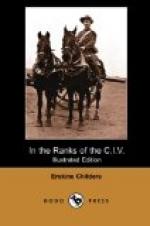In the evening Williams and I made a fire, and cooked our cabbage in our Kaffir pot, a round iron one on three legs, putting in meat and some (looted) vinegar. How good it was! It was the first fresh green food we had eaten since leaving England, and it is what one misses most. Two escaped prisoners of the Canadian Mounted Infantry came to our fire, and we had a most interesting chat with them till very late. They spoke highly of the way they had been treated. In food they always fared just as the Boers did, and were under no needlessly irksome restrictions. They said that in this sort of warfare the Boers could always give us points. They laugh at our feeble scouting a mile or two ahead, while their own men are ranging round in twos and threes, often fifteen miles from their commando, and at night venturing right up to our camps. In speed of movement, too, they can beat us; in spite of their heavy bullock transport they can travel at least a third quicker than we. Their discipline was good enough for its purpose. A man would obey a direct order whatever it was. They only wanted a stiffening of our own class of military discipline to make them invulnerable. They sang hymns every night in groups round their fires, “but are hypocrites.” (On this point, however, my informants differed a little.) They said the leader of this force was Prinsloo, and that we had not been fighting De Wet at all. It seems there are two De Wets, Piet and Christian. There was a rumour yesterday that Piet had been captured near Kroonstadt, though Christian seems to be the important one. But the whole thing is distracting, like constructing history out of myths and legends.
July 29.—Sunday.—Church parade at eleven. It is reported, and is probably true, that the whole Boer force has surrendered. If so we have missed little or nothing. About twenty prisoners came in in the morning, quaint, rough people, shambling along on diminutive ponies. In the afternoon Williams went foraging for the officers, and I visited our Scotch friends, the donors of the cabbage, who were very kind, and asked me in. The married son had just come in from Basutoland, where he had been hiding, a great red, strapping giant, with his wife and babies by him. He had originally been given a passport to allow him to remain neutral, but later they had tried to make him fight, so he ran away, and had been with a missionary over the border, whose house he repaired. It was pleasant to see this joyful home-coming.
Rations to-day, one biscuit and a pound of flour. How to cook it? Some went to houses, some made dough-nuts (with deadly properties, I believe). No fat and no baking-powder. Fortunately, Williams brought back from his expedition, besides fowls, etc., for the officers, some bread and, king of luxuries, a big pot of marmalade, which he bought from a pretty little Boer girl, the temporary mistress of a fine farm. Her father, she proudly explained, was




